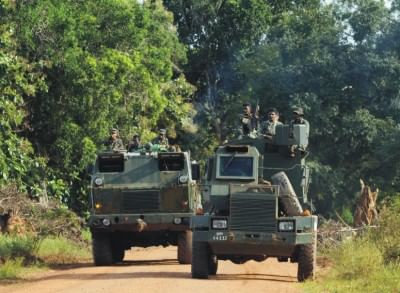<i>Dwindling options for Tamil Tigers </i>

Armoured cars carrying Sri Lankan soldiers drive through the newly captured area of Mullaittivu, the former military headquarters of the Tamil Tiger rebels yesterday. Security forces wrested control over the area on January 25, 2009 after a year of heavy fighting.Photo: AFP
Pinned down by an army that has shown remarkable resilience, increasingly friendless around the world and despised by many of its own, Sri Lanka's Tamil Tiger separatists have never looked so vulnerable in a quarter century of violent campaigning for a separate Tamil nation.
Some 250,000 innocents are trapped between the advancing army and the retreating Tigers as troops fight through Tamil areas. The rebels have lost all their urban strongholds and now are mostly sheltered in the dense jungles of the Wanni, in the north of the island.
The International Committee of the Red Cross has warned of an imminent 'major humanitarian crisis' in the region, with medical facilities overwhelmed by 'hundreds of dead and scores of wounded' during the government offensive on the last strip of rebel-held territory.
On Tuesday Indian foreign minister Pranab Mukherjee flew to Colombo for talks with Sri Lankan government leaders as the army's continued shelling of a designated 'safe zone' took dozens of innocent Tamil lives.
New Delhi is concerned not only because of the unrest in a key neighbour but because of the spillover effects on India's Tamil Nadu state, whose 55 million Tamils have close links with Tamils across the Palk Straits. DMK, the party that runs Tamil Nadu, is Prime Minister Manmohan Singh's most vital coalition ally.
Mukherjee is expected to press Sri Lankan President Mahinda Rajapakse to curb army excesses and particularly avoid civilian deaths.
Those deaths are a casualty of the ferocity with which the mostly Sinhala army, smelling blood, is grinding on through Tiger strongholds. Equally, it is because the Liberation Tigers of Tamil Eelam (LTTE) are using civilians as human shields to protect themselves against the attacks, hoping for precisely the sort of intervention that has now brought Mr Mukherjee to the country.
"We have seen that, unlike past wars in Sri Lanka, this time refugee arrivals in our state have been significantly less," a senior police official in Tamil Nadu told The Straits Times. 'We believe this is because the Tigers are refusing to let families leave the island, so as to keep them as human shields.'
Sri Lanka's army, which used to be a largely demoralised force compared with the hugely motivated Tamil guerillas, has shown newfound determination this past year.
For one thing, thanks to the widespread global disenchantment with the Tigers, many countries, including India, Pakistan and Israel, have supplied the army with much modern weaponry. Sri Lanka also now has a credible air force, which has not hesitated to pummel Tiger areas.
Besides, Colombo gets significant intelligence input from New Delhi, a factor that has helped it intercept dozens of arms shipments meant for the Tigers.
Rebel supremo Vellupillai Prabhakaran is a wanted man in India, which has issued a death warrant on him for orchestrating the murder of former prime minister Rajiv Gandhi during the 1991 election campaign. That murder also eroded sympathy for the Tigers in Tamil Nadu, on whose soil Mr Gandhi died.
"We have no sympathy for any terrorist activities," Mukherjee said as he left New Delhi. "But we are concerned about the plight of the civilians."
Fund raising has also been a problem for the Tigers lately.
The money flows have eased after more than 30 nations banned the group, labelling it a terrorist outfit.
The Tamil diaspora across the world still has lingering sympathy for the 55-year-old Prabhakaran, who turned a docile people into a feared fighting force.
But many have been sickened by his methods: systematically wiping out fellow Tamil leaders who did not accept his supremacy, conscripting child soldiers and extorting money from people in the Tamil areas of Sri Lanka to fund his cause.
"Prabhakaran is facing one of the bleakest chapters in his long-drawn struggle,' says M R Narayan Swamy, a Sri Lanka watcher and author of a biography on Prabhakaran, Inside An Elusive Mind.
"He has never been this badly cornered, militarily or diplomatically. As far as the Sri Lankans are concerned, 95 per cent of the battle is over."
For all that, analysts say that it is early days yet to pronounce the Tigers a vanquished force. They still have more than 1,000 fighters, armed and ready to die. They have been in the jungles before and re-emerged.
B Nadesan, head of the LTTE's political wing, told the BBC this week that 'in a liberation war, it is normal for a force to lose territory and regain the same. In the past, we have withdrawn many times and bounced back'.

 For all latest news, follow The Daily Star's Google News channel.
For all latest news, follow The Daily Star's Google News channel. 



Comments